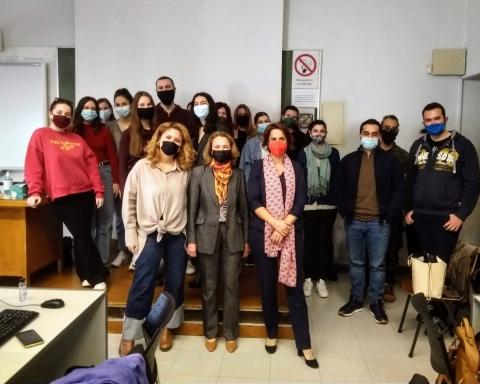
On Thursday, 21 October 2021, our Master’s Students had the opportunity to study “The cultural element in terminology: theoretical and practical views” with Professor Pascale ELBAZ, from the ISIT, the French grande école of Intercultural management and Communication.
Invited by assistant professor Elpida Loupaki and in the context of the course “Contemporary Translation Practices”, taught by Dr Parthena Charalampidou, Professor ELBAZ talked to the students explaining that cultural terminology makes it possible to decipher societal changes through the close observation of language forms in specialised languages. According to Elbaz, the cultural dimension of terminology can be revealed through diachronic or synchronic research, it can concern our current world or a chosen moment in our history, it can concern an artistic, technological or sociological theme. The sample of specialised language subject of the research is necessarily circumscribed in time and place and materialised in two or more languages: the aim is to understand, through terminological differences, the cultural transformations that individuals and human groups are experiencing.
Short bio
Pascale ELBAZ holds a doctorate in languages, literature and societies of the world (specialising in the Chinese world) with a thesis defended in 2014 at Inalco. She is a teacher-researcher at ISIT (Institute of Intercultural Management and Communication), an associate researcher at IFRAE (French Institute for Research on East Asia) and a translator from Chinese and English to French. As a member of the FIT (International Federation of Translators) Research Task Force and the ISIT Scientific Committee, she reflects on the transformations that the translation profession is undergoing today. Her research focuses on two main areas: the history of the transfer of concepts, terms and images between Europe and the Far East and the pedagogy of multilingual terminology and translation in the digital age. She supervises research master theses in comparative terminology, orienting the students’ work towards the cultural dimension.

